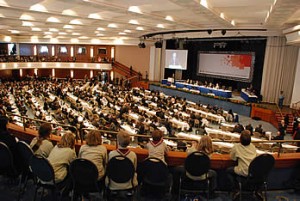More analysis to come….this was delivered by Venezuela
Submission on the Ad-Hoc Working Group on the Durban Plataform (AWG-DP)
Bonn, 22nd of May
Thank you for giving me the floor.
The Bolivarian Republic of Venezuela has the honor to make a statement on behalf of Argentina, Algeria, Bahrain, Bolivia, China, Comoros, Cuba, Democratic Republic of Congo, Djibouti, Ecuador, El Salvador, Egypt, India, Iraq, Jordan, Kuwait, Libya, Malaysia, Mauritania, Morocco, Nicaragua, Oman, Palestine, Philippines, Qatar, Saudi Arabia, Syria, Somalia, Sudan, Thailand, Tunisia, United Arab Emirates and Yemen.
The developing countries associated with this statement account for over 4 billion people on our planet or roughly 60% of the global population, with high incidence of vulnerability to climate change. We have a high stake not only in the ongoing negotiations but also in the important process that we launched at Durban as part of a balanced package.
We assure you of our keenness to expeditiously move forward with the substantive work of the AWG-DP. We wish to assure all our partners that we will spare no effort in reaching out to them and any other partner in finding a solution.
However, AWG-DP agenda is not a procedural discussion but one of substance and scope, both of which will have deep implication on our work. The agenda we adopt here will guide us in this process at least until the end of this year. We are confident that a frank discussion at this stage would enhance our collective understanding on the way forward. We would reiterate our openness to receive and discuss all proposals made by parties on the agenda in a spirit of constructively moving forward. At the same time, we hope that other parties would also take on board our ideas and concerns and that such issues would also receive the consideration they deserve.
We are constructively engaged in this important exercise of agreeing on an agenda that all parties feel ownership of, thereby ensuring the context, quality and momentum for our work. The discussion we had on Saturday was a useful one and it enriched our
understanding of the views held by parties in this debate.
It would be important to give due time and space to open-ended consultations, including in an informal setting. We would strongly encourage that all future consultations on this be held in an open-ended, transparent and inclusive manner rather than by invitation.
We express our willingness to substantively discuss the post 2020 mitigation framework going forward. At same time, we have no doubt that mitigation actions need to be enhanced during 2012-2020. However, at this stage, we foresee that a separate agenda item on enhancing mitigation ambition in the AWG-DP would render meaningless the ongoing discussions of both the AWG-KP and AWG-LCA. In addition, it would delay actions and decisions in those forums. We stress that the context for ambition is provided by the Kyoto Protocol where we are discussing the 2nd commitment period. In addition, for those parties who are not party to the Kyoto Protocol or would not abide by that treaty, also have a responsibility to ensure comparability of their targets and actions under the AWG-LCA. The AWG-LCA is a depository of several actions, not just mitigation actions. Disaggregating the discussion entirely from KP and LCA context would jeopardize the fundamental equity principle of differentiation between Annex-I and non-Annex-I countries under the Convention, aside from weakening the legally binding nature of commitments and converting it to a voluntary scheme of actions
for developed parties. It will impose an inequitable burden on developing countries in meeting the ambition gap.
With a view to ensure that mitigation ambition under the DP is closely linked to work of parties under the two other groups- namely LCA and KP, we would like to propose the inclusion of the following footnote in the agenda:
The implementation of Decision 1/CP.17 should be examined on the basis of its compliance with International Law, in accordance with the principle of pacta sunt servanda and, in particular, with the exception on non-performance related to the full respect and compliance with the UNFCCC and its Kyoto Protocol, for the Parties that are Parties of those instruments.
Madam,
We note that the decision 1.CP/17 establishes the Durban Platform for ‘Enhanced Action’, and is not restricted to ‘Mitigation Action’ alone. We have no doubt that on the basis of science, urgent mitigation ambition is needed. However, mitigation alone will
not sufficient. Our collective ambition on other Bali Pillars namely Adaptation, Finance and Technology is also equally, if not more important to this process.
Let me conclude by saying that we fully support an inclusive agenda that captures, in a non-selective manner, all the elements of decision 1.CP/17 and so that it may provide an acceptable basis to start work immediately. The agenda needs to capture the mutual
assurances of all parties exchanged at Durban. It will be more positive if we keep it as comprehensive and broad based as possible and elaborate it in the light of inputs received from LCA and KP. In the meantime we should begin a discussion on developing our understanding on the scope of work under the Durban Platform.
*****



